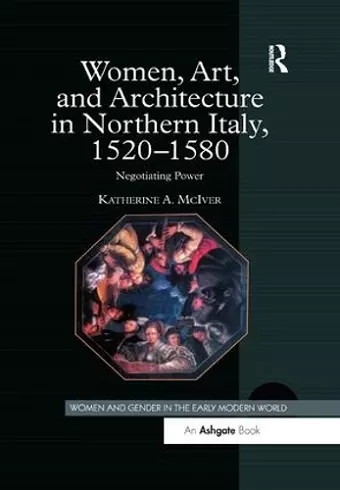Women, Art, and Architecture in Northern Italy, 1520–1580
Negotiating Power
Format:Paperback
Publisher:Taylor & Francis Ltd
Published:27th Oct '17
Currently unavailable, and unfortunately no date known when it will be back
This paperback is available in another edition too:
- Hardback£150.00(9780754654117)

Expanding interdisciplinary investigations into gender and material culture, Katherine A. McIver here adds a new dimension to Renaissance patronage studies by considering domestic art - the decoration of the domestic interior - as opposed to patronage of the fine arts (painting, sculpture and architecture). Taking a multidimensional approach, McIver looks at women as collectors of precious material goods, as organizers of the early modern home, and as decorators of its interior. By analyzing the inventories of women's possessions, McIver considers the wide range of domestic objects that women owned, such as painted and inlaid chests, painted wall panels, tapestries, fine fabrics for wall and bed hangings, and elaborate jewelry (pendant earrings, brooches, garlands for the hair, necklaces and rings) as well as personal devotional objects. Considering all forms of patronage opportunities open to women, she evaluates their role in commissioning and utilizing works of art and architecture as a means of negotiating power in the court setting, in the process offering fresh insights into their lives, limitations, and the possibilities open to them as patrons. Using her subjects' financial records to track their sources of income and the circumstances under which it was spent, McIver thereby also provides insights into issues of Renaissance women's economic rights and responsibilities. The primary focus on the lives and patronage patterns of three relatively unknown women, Laura Pallavicina-Sanvitale, Giacoma Pallavicina and Camilla Pallavicina, provides a new model for understanding what women bought, displayed, collected and commissioned. By moving beyond the traditional artistic centers of Florence, Venice and Rome, analyzing instead women's artistic patronage in the feudal courts around Parma and Piacenza during the sixteenth century, McIver nuances our understanding of women's position and power both in and out of the home. Carefully integrating extensive archival
Prize: Co-winner of the Society for the Study of Early Modern Women Book Award for a work published in 2006 '... a fine and welcome study ... provides a new model for understanding what women bought, displayed, collected, and commissioned. Carefully integrating extensive archival research with a set of important critical inquiries, McIver offers up a well-balanced picture of domestic space, subject and object in and against what might be called the unbalanced field of Italian Renaissance art history.' Allison Levy, Wheaton College, USA ’Through the use of newly discovered archival evidence, Katherine McIver offers an innovative and illuminating analysis of female patronage in Northern Italy during the sixteenth century... she present revealing new insights about how early modern women exercised political agency and economic power within a patriarchal society... The detailed appendix of documents will be of note both for those with a particular interest in material culture of the Early Modern period as well as a wider audience... this is a valuable study with a strong methodological framework combining the close reading of original documents with well-balanced critical analysis of a variety of visual material.’ The Art Book ’The book cleverly fills in some of the lack of sources in English and aptly testifies to the depth and liveliness of the cultural debate about women in Renaissance Italy between the 14th and 17th centuries... The superb peculiarity of McIver's work consists in giving a new historical perspective on women's power, displayed in different manners and strategies in order to maintain and increase family properties, or even to advance their social status.’ Women's History Magazine ’The publisher, Ashgate, is to be thanked and congratulated for allowing the author to include almost fifty pages of transcribed inventories and a glossary... This ensures that the book will become an invaluable resource for work on women as patrons and consume
ISBN: 9781138275737
Dimensions: unknown
Weight: 560g
300 pages